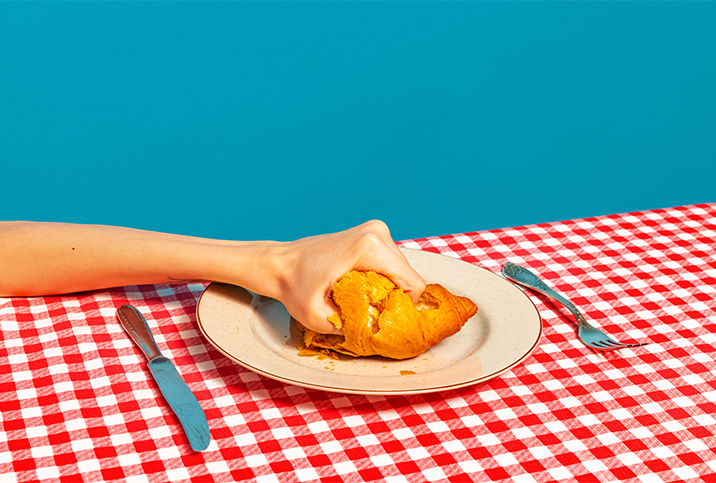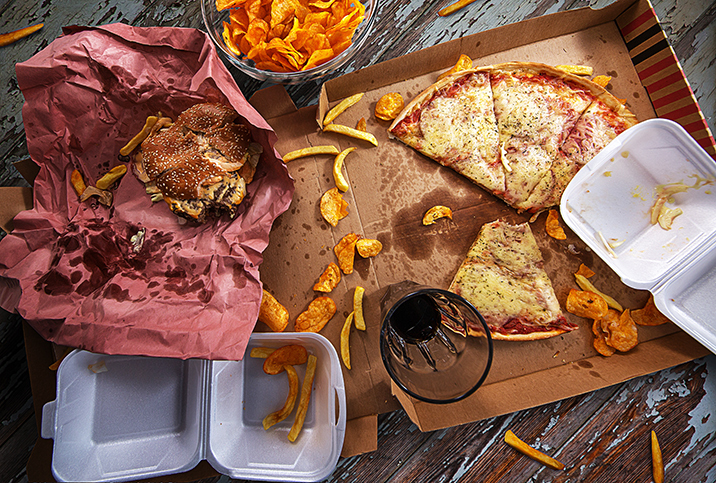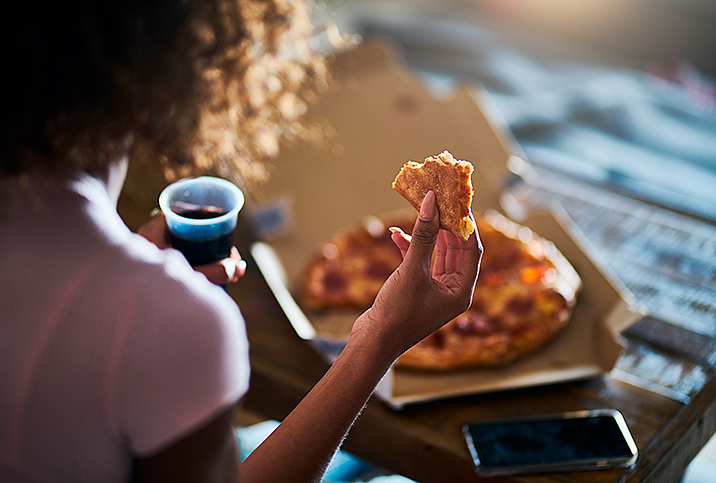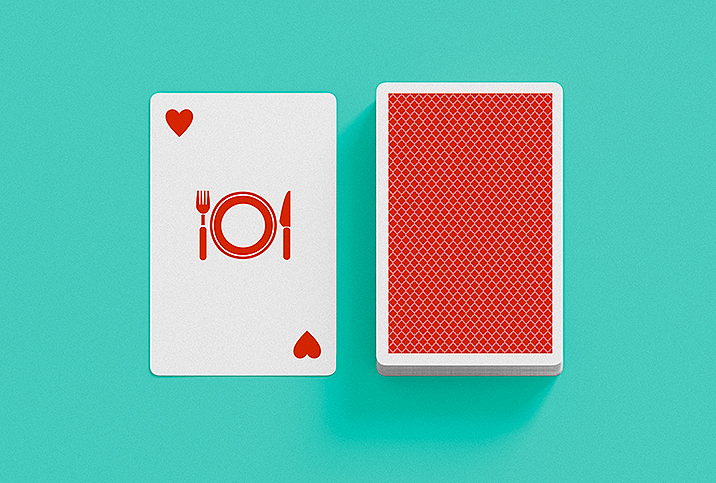Millions of People Watch Mukbang, but Is It a Harmful Influence?

How would you respond if a stranger invited you to come over and watch them eat an inordinate amount of food? What if they countered your hesitation by mentioning millions of other people will be watching, too?
Originating in South Korea sometime in 2010, mukbang, an eating show, has taken social media by a messy, culinary binge-eating storm. That's right, people are achieving fame and fortune by filming themselves stuffing their faces with food while engaging with proverbial viewers. And nothing is off the menu, from pounds of tentacles to every item on a McDonald's menu.
"Mukbang" comes from the Korean word "meokbang," compounding "meongneun" ("eating") and "bangsong" ("broadcast"). The phenomenon started on YouTube but has cemented itself as its own genre across social media platforms, including Instagram and TikTok.
On its face, it sounds like a "Black Mirror" version of the Food Network, except it has very much become a part of modern culture. Unlike other trends that fizzle as quickly as they reach virality, mukbang's dedicated fan base continues to rise in numbers.
What's the allure behind all the slurping and chewing?
Well, mukbang gives "food porn" a new meaning.
Are you not entertained?
Entertainment is the foundation of most trends on social media, and influencers tend to present themselves as your virtual best friend to accompany and guide you in all areas of life. It's no wonder that many mukbang viewers plan their meals around these videos.
However, New York City-based licensed psychotherapist and eating disorders specialist Sarah L. Davis, L.M.H.C., L.P.C., said there's also a strong sensory component that makes these videos captivating.
"[Mukbang videos] may produce what is known as an autonomous sensory meridian response—ASMR—pleasurable tingling sensations along the skin," Davis said. "Viewers experience this from the sounds elicited during the video, which can include chewing sounds, the sounds from opening packages, preparing and cooking foods, and so on."
It's not unlike psychologist B.F. Skinner's approach to positive reinforcement. You've experienced these sensations enough in a pleasurable manner (who doesn't speak the love language of food?), therefore, they elicit positive emotions.
Taboo makes mukbang more alluring
Davis pointed to the taboo nature of people so carelessly gorging on piles of unhealthy food. The internet shames Americans with new ways to eat healthy or "clean," whereas mukbang influencers are seen as daredevils by a society often held hostage by the fear of becoming fat.
There's also the shock factor because most mukbang influencers tend to have objectively thin or average body sizes.
"Food restriction is associated with an increased obsession with food," Davis said. "As such, mukbang can become an outlet for those obsessions. Individuals may watch mukbang to have an experience of eating vicariously through these influencers, potentially gaining a sense of vicarious pleasure of eating."
Nearly all eating disorders—such as anorexia, bulimia and binge eating disorder—include restriction symptoms. When someone is in a semi-starvation state, they are much more vulnerable to outside triggers that create urges to act on disordered eating behaviors.
However, Davis emphasized that even if you're not triggered to binge, using these videos as an outlet for food obsession stemming from restriction further exacerbates an unhealthy relationship with food, body image and self-worth.
Where there's a will, there's a kink
Mukbang videos have also garnered an unintended fan base: viewers who get sexual pleasure from watching the video host consume their weight in food.
Dulcinea Alex Pitagora, Ph.D., L.C.S.W., a sex therapist in New York City, explained that it's possible to have sexual arousal from pretty much anything. Mukbang can be considered a kink by the people watching and/or eating, or it might be an unknown, subconscious form of arousal.
"Prior to when mukbang first aired, there have been people engaging in kink who identify as feeders and feedees, those who are sexually aroused by consuming or viewing the consumption of food, often for the purpose of weight gain, which in itself can also be sexually gratifying to feeders/feedees," she added.
Board-certified sexologist and sex educator Suzannah Weiss, of Los Angeles, noted that scholars have argued about the sexual gratification some viewers might find in mukbang.
"One study, for instance, found that host attractiveness was one factor in people's decision to watch mukbang," she added. "Others have suggested that in Korea, where pornography is legally prohibited, mukbang may serve as an alternative for those who are sexually aroused by it."
People like mukbang for various reasons
Like most of what comprises social media trends, mukbang's popularity doesn't come with a hidden agenda—it just is. The reason people may partake in mukbang or like to watch it is unique to each user, which is why it's crucial to do your research, talk to friends, family or a professional, and come to terms with whether it's healthy for you.
You might want to think twice before tuning in to watch if you have an eating disorder or a history of disordered eating. If it turns you on, as long as it's not negatively impacting other areas of your life, it may be no more harmful than porn. As for the influencers, Davis explained that regularly creating this type of content could greatly affect their hunger and fullness cues, which take time to regain and for their bodies to trust them again.
All in all, she advised that you should take note of how you feel before, during and after you engage with mukbang, which is actually an intelligent approach to social media in general. Instagram and TikTok might have facilitated human connection, but doesn't food taste best when it's shared over a table instead of through a screen?
"Bon appetit" is meant to be used as a friendly enticement to enjoy your meal and should not be interpreted as a dare.


















